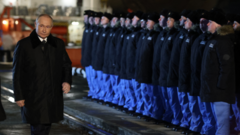During an Arctic Forum in Murmansk, Russian President Vladimir Putin focused on strengthening Russia's position as a leader in the Arctic region, underlining an ongoing geopolitical competition. He distinguished that discussions regarding Greenland's future are strictly between the U.S. and Denmark, and declared that the matter "has nothing to do with us." This statement comes in the context of attempts to rebuild U.S.-Russia relations post-Trump administration, where cooperation in economic endeavors in the Arctic is being eyed, though contingent upon the conclusion of the ongoing war in Ukraine.
Putin Emphasizes Cooperation in Arctic Amid Greenland Remarks

Putin Emphasizes Cooperation in Arctic Amid Greenland Remarks
Vladimir Putin signals a shift towards collaborative efforts in the Arctic while addressing Greenland's status as a U.S. concern during a recent forum in Murmansk.
In his speech, Putin acknowledged the seriousness of American interests in Greenland, a territorial focus underscored by the previous administration's ambition to acquire the island. In this light, he has eschewed criticisms of U.S. policies during his address, which signals a potential thaw in U.S.-Russia relations as both nations share an interest in Arctic resources and investments.
Echoing Putin's sentiments, Kirill Dmitriev, the head of the Russian Direct Investment Fund, indicated that Russia is open to joint projects with the U.S. in various sectors, contingent on political developments in Ukraine. However, he keeps an optimistic outlook on bilateral dialogues, suggesting that a mutual understanding is forming.
Nikolai Patrushev, a close advisor to Putin, remarked on the shifting political dynamics in the U.S., suggesting the emergence of a multipolar world which may allow for pragmatic cooperation between Russia and both U.S. political parties. Amidst these discussions, local voices in Murmansk show varied perceptions towards American cooperation, reflecting broader uncertainties about the future of U.S.-Russia relations in the context of Arctic developments.
Meanwhile, Dmitriev's praise for American innovators like Elon Musk hints at the potential for partnerships in areas like space exploration. As Russian ambitions in the Arctic and relations with the U.S. evolve, citizens from the region express mixed feelings regarding these geopolitical maneuvers, providing a glimpse into the complex public sentiment surrounding international collaboration.
Arctic relations are not just geographical; they touch upon wider themes of diplomacy, economic strategy, and the implications of past hostilities while suggesting that cooperation may pave a new way forward for dialogue between countries historically at odds.
Echoing Putin's sentiments, Kirill Dmitriev, the head of the Russian Direct Investment Fund, indicated that Russia is open to joint projects with the U.S. in various sectors, contingent on political developments in Ukraine. However, he keeps an optimistic outlook on bilateral dialogues, suggesting that a mutual understanding is forming.
Nikolai Patrushev, a close advisor to Putin, remarked on the shifting political dynamics in the U.S., suggesting the emergence of a multipolar world which may allow for pragmatic cooperation between Russia and both U.S. political parties. Amidst these discussions, local voices in Murmansk show varied perceptions towards American cooperation, reflecting broader uncertainties about the future of U.S.-Russia relations in the context of Arctic developments.
Meanwhile, Dmitriev's praise for American innovators like Elon Musk hints at the potential for partnerships in areas like space exploration. As Russian ambitions in the Arctic and relations with the U.S. evolve, citizens from the region express mixed feelings regarding these geopolitical maneuvers, providing a glimpse into the complex public sentiment surrounding international collaboration.
Arctic relations are not just geographical; they touch upon wider themes of diplomacy, economic strategy, and the implications of past hostilities while suggesting that cooperation may pave a new way forward for dialogue between countries historically at odds.



















